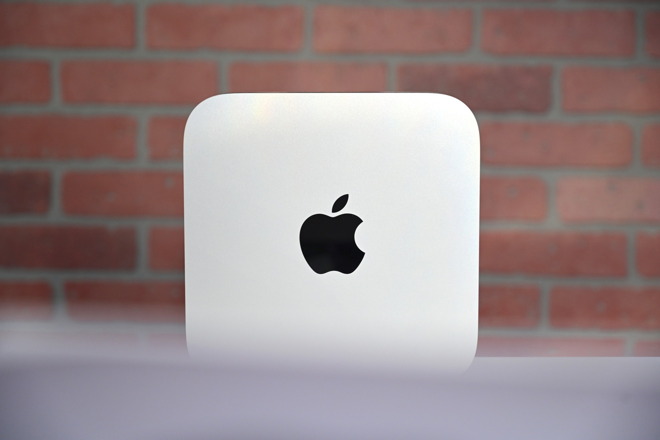M1 Mac mini catapulted Apple to number one in Japanese desktop PC market
The new M1-equipped Mac mini has propelled Apple to the number one spot in the Japanese desktop PC market in the two weeks after the device's launch.

Credit: Andrew O'Hara, AppleInsider
That's according to new data from Japanese analysis firm BCN Retail, which aggregated the sales data of mass retailers and online stores in the country. In the period between August 1 and November 3, Apple held a 15% share of the desktop PC market in Japan and was fighting for third place with Lenovo.
With the launch of the first Apple Silicon Mac mini on November 17, BCN Retail tracked a surge in Apple computer sales that resulted in the Cupertino tech giant taking the number one spot by sales volume. BCN Retail reports that Apple now has 27.1% of the market, increasing 14.4% percentage points in a single week.
Apple's Mac lineup has had one of the best years in some time in 2020, driven largely by tailwinds from the new remote education and work-from-home environment during the ongoing coronavirus pandemic. In its Q4 2020 earnings report, Apple announced all-time record high revenues for the Mac segment.
The 2020 Mac mini is Apple's first desktop with a proprietary M1 chipset, which includes an eight-core CPU, eight-core GPU, and unified memory. In benchmark testing, the M1 chip beat out the higher-tier Intel Mac mini by large margins.
Apple's new M1-equipped Mac mini starts at $699, which nets users the M1 chip, 8GB of unified memory, and 256GB of internal SSD storage.

Credit: Andrew O'Hara, AppleInsider
That's according to new data from Japanese analysis firm BCN Retail, which aggregated the sales data of mass retailers and online stores in the country. In the period between August 1 and November 3, Apple held a 15% share of the desktop PC market in Japan and was fighting for third place with Lenovo.
With the launch of the first Apple Silicon Mac mini on November 17, BCN Retail tracked a surge in Apple computer sales that resulted in the Cupertino tech giant taking the number one spot by sales volume. BCN Retail reports that Apple now has 27.1% of the market, increasing 14.4% percentage points in a single week.
Apple's Mac lineup has had one of the best years in some time in 2020, driven largely by tailwinds from the new remote education and work-from-home environment during the ongoing coronavirus pandemic. In its Q4 2020 earnings report, Apple announced all-time record high revenues for the Mac segment.
The 2020 Mac mini is Apple's first desktop with a proprietary M1 chipset, which includes an eight-core CPU, eight-core GPU, and unified memory. In benchmark testing, the M1 chip beat out the higher-tier Intel Mac mini by large margins.
Apple's new M1-equipped Mac mini starts at $699, which nets users the M1 chip, 8GB of unified memory, and 256GB of internal SSD storage.

Comments
https://archlinuxarm.org/packages/arm/gcc-fortran
I thought that gcc not working on M1 was just a rumour?
1. It is expensive. (Whereas gcc-fortran is free.)
2. It is only Fortran 95 (with Fortran 2003 and 2008 features). @blastdoor almost certainly wants gcc-fortran 10, which is based on Fortran 2018.
The alternative: pay a ton in licensing for a badly outdated Fortran version. Better off sticking with the Intel Mac on the current machine until gcc is available, which according to what I read would occur in 2Q 2021. That is, if it isn't a rumour in the first place. Also, even if it isn't a rumour, I severely doubt that it will take that long. There are CERTAINLY a bunch of open source types building and testing gcc against M1 Macs as we speak and will likely have their first submits in a few weeks.
ALSO ... would an 8/16 GB machine be sufficient for Fortran stuff anyway? That sounds like 64 GB Mac Pro stuff to me. So ... maybe wait till the M1X Macs with 32/64 GB come out in 2021? That way both the necessary hardware and up-to-date free and open source software should be available. As impressive as the M1 MBA/MBP/Mac Minis are, they are still entry level machines whose performance is roughly akin to hexacore AMD and Intel CPUs (even if they run a lot cooler and use much less power).
Buckle up
https://developer.r-project.org/Blog/public/2020/11/02/will-r-work-on-apple-silicon/index.html
In particular, they write:
It's really R that I need, and R needs Fortran.
Yup, it should be just a matter of time, and probably not a lot of time. I do a lot of work in R and R requires Fortran -- that's the basis for my need.
16 GB is a little snug, but generally sufficient for my purposes. While more RAM would certainly be nice, 16 GB for 8 cores isn't horrible. And dropping down to using only the 4 big cores would be an option in cases where I need more RAM per core.
By the time I'm ready to replace my Linux box (which I bought to replace my 2009 Mac Pro), though, I'm hoping there will be headless desktop Mac with more big CPU cores and more RAM.
https://eshop.macsales.com/shop/owc-thunderbolt-hub
Meanwhile I'm enjoying my M1 Mac.
Not true. Apple said it is upto Microsoft to port Windows to M1. So, Apple is open for Windows or Linux to be ported to M1. It is WIN,WIN for both.
they do daisy chain if the devices have at least two tb3 ports.